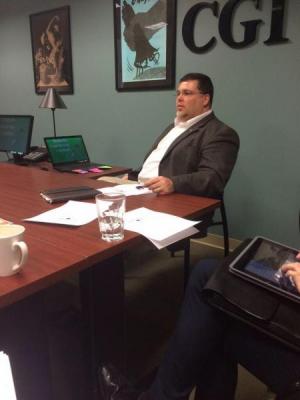John DeRosa, S-CAR MS Student
 John DeRosa came to S-CAR "looking for alternative approaches to national security challenges. "I was confronted with finding a new path for myself," he said. John is a second year MS student who enrolled at S-CAR after completing a fellowship with the Massachusetts Institute of Technology's Seminar XXI. The transdisciplinary approach of S-CAR encouraged John to continue his Seminar XXI investigation on how various analytical lenses reveal different courses of action to resolve security challenges.
John DeRosa came to S-CAR "looking for alternative approaches to national security challenges. "I was confronted with finding a new path for myself," he said. John is a second year MS student who enrolled at S-CAR after completing a fellowship with the Massachusetts Institute of Technology's Seminar XXI. The transdisciplinary approach of S-CAR encouraged John to continue his Seminar XXI investigation on how various analytical lenses reveal different courses of action to resolve security challenges.
Unexpectedly, the lessons learned from this investigation had immediate application to his work in the Department of Defense and as an Adjunct Professor. Seminar discussions and conversations at S-CAR's various centers of practice informed and influenced elements of defense strategic planning he supports. In revamping his classroom to incorporate an elicitive approach, he discovered new voices in his classroom that has students asking about when is the next class he'll teach. John attributes finding a new path in his professional and personal life to the faculty and fellow students at S-CAR. "Their care, concern, and coaching has helped shaped a personal resiliency and provided me space to negotiate a new understanding of my experiences as a veteran of war." This resilience and understanding has allowed him to engage in new conflict spaces and to re-engage in familiar conflicts in new ways. This past summer he returned to Kosovo, where he once served as a peacekeeper, to facilitate a narrative-based program intended to collectively generate relationship patterns between the military and civil society that contribute to shaping a local security guarantee.
In November, he led the "Battle of the Narrative" workshop to develop an understanding of alternatives to the “weaponization” of narratives by military commanders. Ultimately, John would like to discover how societies in the midst of protracted conflict collectively generate relationships patterns that contribute to shaping locally sustainable security guarantees. This research should inform the development of non-coercive alternatives to traditional military interventions that engage societies in a manner better suited to resolving security dilemmas through domestic means.




